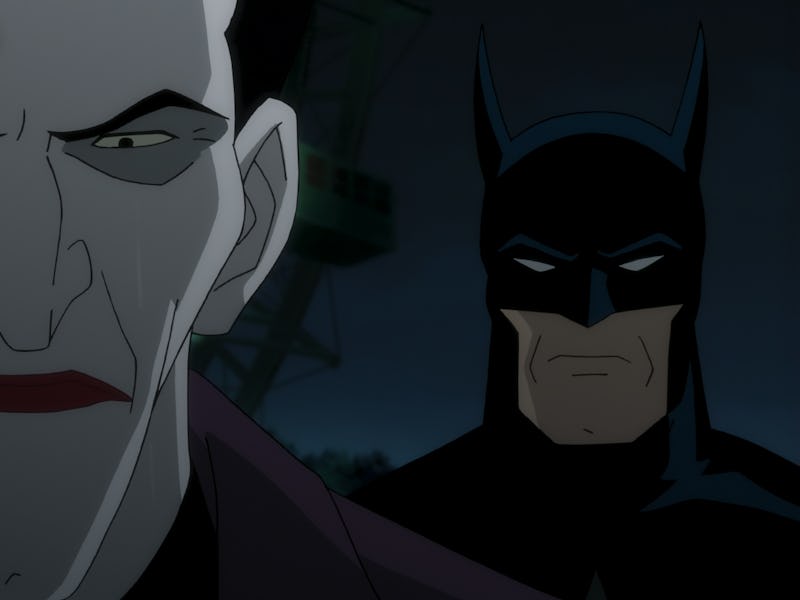'Batman: The Killing Joke' Composers Went Mad to Get Joker's Sound
"I had to become a different kind of person," says Michael McCuistion of the musical group DMP.

To say all eyes are on Batman: The Killing Joke is an understatement. The animated version of Alan Moore’s comic that explores the origins of Batman’s arch-nemesis the Joker, amid a hostage plot, is one of the most-anticipated animated movies ever from comic book powerhouse DC. Its R-rating from the MPAA has only heightened anticipation ahead of its debut at San Diego Comic- Con this weekend.
Directed by DC veteran Sam Liu, The Killing Joke follows one night when the Joker — voiced by Star Wars alum and famed Joker actor Mark Hamill — lures Batman (Kevin Conroy) into a trap to prove that all it takes to become Joker-level mad is one bad night. The movie is set to be one of the biggest theatrical releases for Fathom when it opens July 25.
A faithful adaptation of Moore’s influential book, the film sports an expectedly creepy score from composers Lolita Ritmanis, Kristopher Carter, and Michael McCuistion, of the Emmy-winning Dynamic Music Partners (DMP). Citing varied influences like Johann Strauss and Nine Inch Nails, DMP tells Inverse its stylistic cues for The Killing Joke were diverse, exploring jazz noir, Bernard Herrman … and their own worst experiences. To get in the head of Gotham’s clown prince of crime, DMP found itself looking at its members own inner demons.
'Batman: The Killing Joke' composers DMP with famed 'Joker' actor Mark Hamill.
“I know for me it was a very dark experience,” said Ritmanis, a fixture in the animated superhero genre. “I wanted to try to feel what [the Joker was] feeling. I tried to figure out in my life times that have been devastating to me, to get into the deeper aspect of that human experience.”
An Emmy-winning composer who previously scored shows like Batman Beyond and Marvel’s Avengers Assemble, Ritmanis sees The Killing Joke as the evolution of a long career. “I don’t think I could have written the music I wrote when I was starting out at age 17 or 18,” she said. “Having gone through more life experiences, death in the family, illness, just any heavy experience. It’s a maturity level. I don’t want to sound high-brow, [but] it’s a fine line between somebody being a bit disturbed on a certain day and going off the deep end.”
“Everyone has a little bit of a dark side,” she added. “Joker just has a very, very big dark side. There’s something endearing about him, which … it’s disturbing I find something endearing about him. This movie is so much more about what he’s feeling and the audience trying to get a glimpse from a deeper place.”
Though Ritmanis admitted she was unfamiliar with the Killing Joke story, she believes her perspective worked to her benefit. “I was really only concerned with how I can help tell the story producer Bruce Timm and Sam Liu wanted to tell. They’re true to the novel as I understand. Without having a history and attachment to the novel, it’s a fresh approach for me.”
Her colleague, Michael McCuistion, also changed while on The Killing Joke. “I had to become a different person kind of person to be able to write the music,” he told Inverse. “I’m a naturally positive guy, I tend to see the silver lining in things. That’s not what this job was. I had to find a raw, punishing way of expressing myself.” Likening the gig to an actor, McCuistion had to “live and perform” in a darker place with an “authenticity that read as honest.”
“That was really my process in trying to find the right way of expressing what I was feeling when I was on this project.”
Their other partner, Kristopher Carter, says he didn’t change, but did struggle to find the tone for the film – which came with overwhelming expectations. “Because there is enough tragedy and despair in this movie, we wanted to make sure the music wasn’t all one note and sit in this one space,” he noted. “How can we find the gradience of the emotions? How are we going to shape that?”
Looking at previous Jokers and their music in pop culture history — from Cesar Romero in the 1966 Batman series composed by Nelson Riddle and Billy May, to Heath Ledger’s urban terrorist in The Dark Knight, scored by Hans Zimmer — wasn’t really an option for the group. “I don’t think we wanted to pay homage as much as tell his story as it’s told in this tale,” he said. “There are universal characteristics: He’s deeply tormented, he’s crazy, he wants to spread that psychosis. Those are the things we were looking towards.”
And since the film was animated, unlike previous Jokers in movies they could have sourced, it gave DMP even more leeway. “In some way it makes it a little more disturbing. Animation leaves so much to the imagination. We get to fill in the gaps left by the drawing. In that way, I think it’s even more powerful.”
Batman: The Killing Joke premieres at San Diego Comic-Con with a limited theatrical release on July 25. It will be available on DVD and Blu-ray August 2.